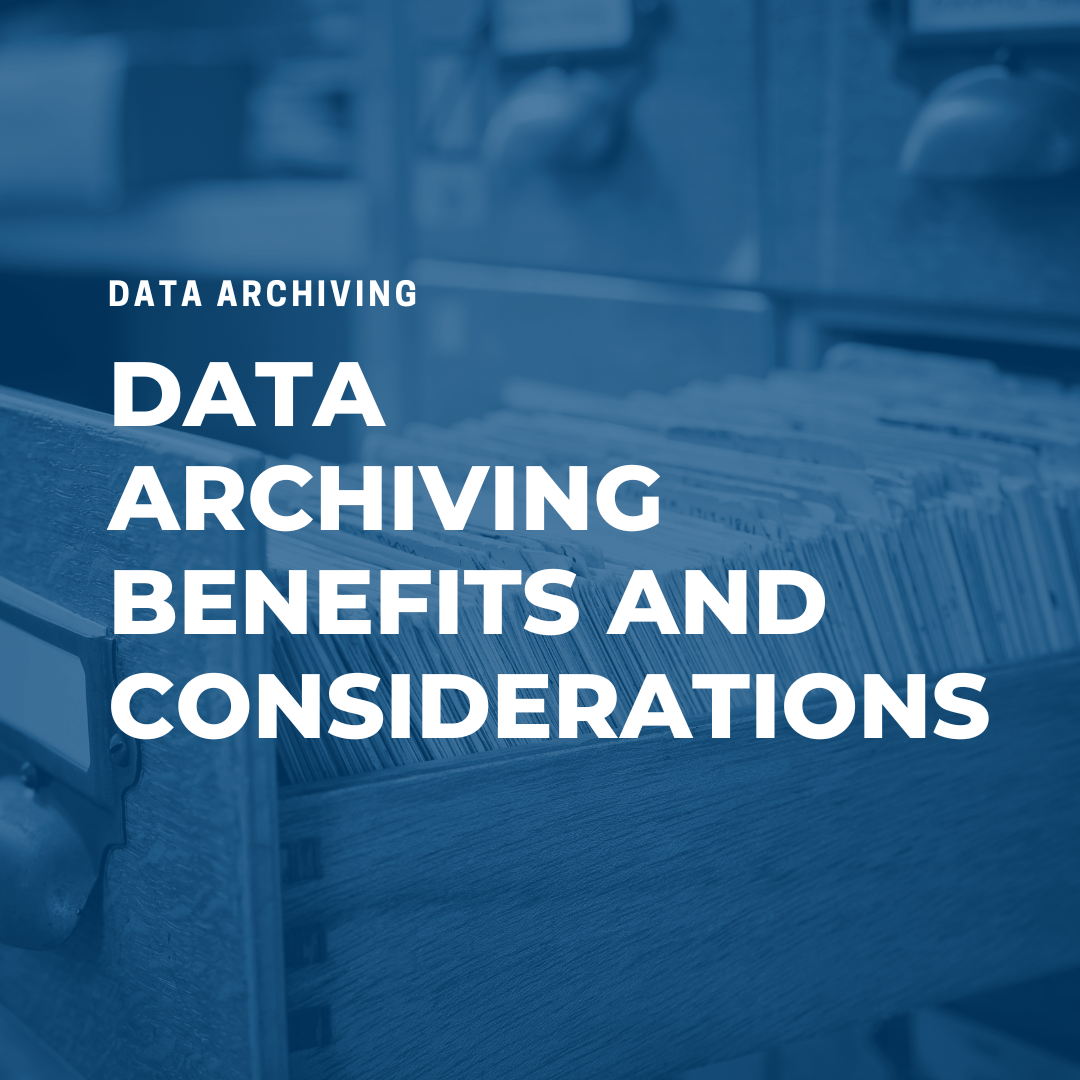Data Archiving Benefits and Considerations You Should Also Be Aware Of
The complete data archiving guide explores what data archiving can mean for businesses who handle big data, how to implement a winning strategy and maintain data governance.
In this article, we discuss the benefits of carrying out the process and identify risks which you should be aware of before establishing your data archiving solution.
Table Of Contents
Why Is Data Archiving Important?
Benefits
Considerations
Mitigating Risks
The Importance Of Data Archiving
The definition of data archiving confirms that data archiving should be a routine exercise, as part of the best practices for healthy database administration. Without the exercise in place, you risk consuming unnecessary primary storage and increasing the associated storage costs. You put your systems at risk of security issues and downtime due to the impact on performance.The benefits of data archiving support the importance of carrying out this task. There are many benefits and considerations that you should also be aware of.
Benefits and Considerations
Advantages To The Process
Primary Storage Consumption
The first advantage of moving data to a secondary storage solution is that you create more space in the primary software. This impacts the speed of data backups which could be crucial during disaster recovery. There is also the additional benefit that the associated cost declines.
Cost Effective Storage
Reorganising system storage allows you to reconsider pricing and acquire a data archiving solution with tiered pricing. Therefore, you pay less for infrequently accessed data. Thus, creating an efficient solution which alleviates budget for other business operations.
Pricing models do vary, so make sure you consider this as part of your checklist for choosing the best data archiving software.
Restore Performance
With storage consumption under less pressure, performance can reach its full potential. Typically, reduced performance incurs slower response times, which can be frustrating. Besides, it is inefficient for employees tasks to take longer due to system performance.
Prevent Data Loss
Data loss is often a subsequent action of poor performance, due to the associated risks.
There is also a common misunderstanding of data archives vs data backups. Storing these separately can help with data loss prevention. And, when running data backups you will no longer waste backup times on inactive data.
Regulatory Compliance
Data archiving assists your efforts toward regulatory compliance. By archiving data on a regular basis, you can demonstrate that data is only kept for the required time period and you are removing historic data as soon as it is no longer relevant to the company.
Although, it is also a consideration that each industry is subject to different regulations and there are other standards you should meet to ensure compliance, besides archiving alone.
De-Duplicating Data
Furthermore, de-duplicating data is a benefit with most of the different data archiving tools. De-duplication of information is often a standard feature, which will identify multiple entries of the same information. Using this can consolidate information and create more free space.
Increased Security
As a result, of better performance you also increase the security of your database environment. There are two parts to this advantage. The first, is in direct response to the pressure that your primary storage may have been under. Thus, causing poor management and maintenance, which would lead to database administrators failing to identify threats and perform patches.
The second part of this benefit is a reflection of the data archiving policy which accompanies the strategy. The policy improves data governance and hold staff accountable for instances. Thus, resulting in less security breaches.
Considerations
Compliance
While regulatory compliance is considered a benefit, it is crucial that we highlight the importance of checking your requirements and making additional efforts to comply with laws.
Regulatory compliance cannot be assumed a direct result of the process. Depending on the industry your company is in, you may need to meet specific requirements. You should factor these into your data archiving strategy.
Data Backups
Your backup data should be stored separately from your archival data. The two data sets hold different values to your company, and are not to be confused. Archived data is helpful in the event that you need to report on findings from financial data or historical data. Meanwhile, your backup data is a full copy of your data centre. And, it is used as a preparation tool for disaster recovery.
Full Data Lifecycle Management
Many of the benefits to data archiving will only reach maximum potential when carrying out the process alongside other best practices. Data archiving is one of the final steps in a data’s lifecycle. You should ensure good database health throughout creation, and day-to-day administrative tasks. By doing so, you are more likely to create a healthy database environment.
Mitigating The Risks
To mitigate any risks presented by the data archiving process, ensure you create a policy. The policy should be a written document, accessible by all stakeholders. We have prepared a separate article to help you write a data archiving policy.
<< Back to Knowledge Centre
